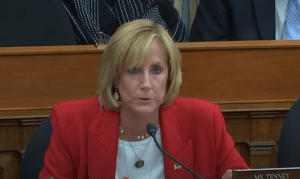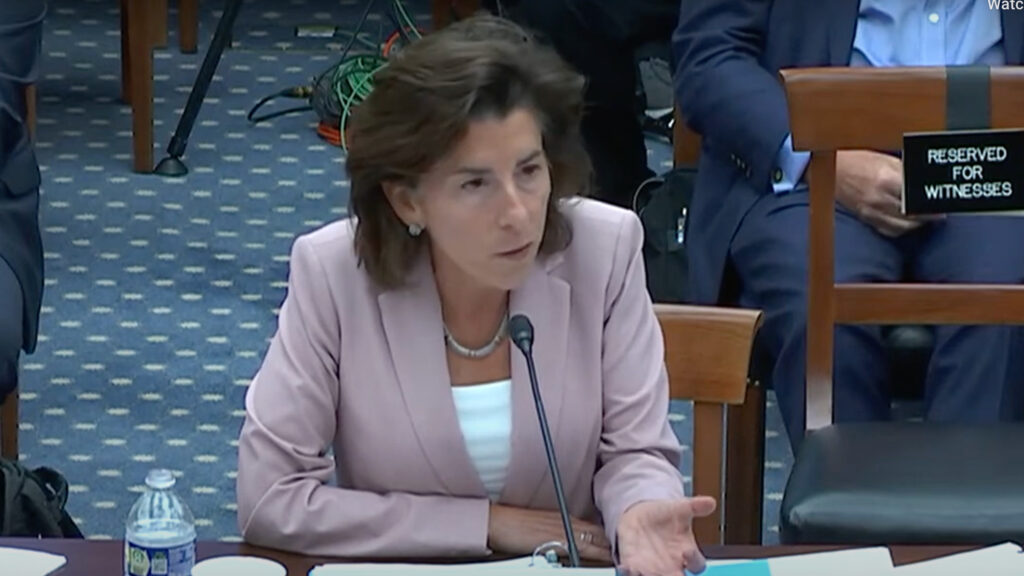Spending guardrails are still being worked out in the CHIPS and Science Act signed into law last year by President Biden, his Commerce Secretary, Gina Raimondo, told the House Science, Space and Technology Committee on Tuesday in a hearing.
Rep. Brian Babin (R-TX-36) [Opening Remarks] chaired the Committee. Raimondo was the only witness. He said the guardrails were being written so that companies would not be allowed to invest in similar chip manufacturing in China for a period of ten years, but asked how much longer were they going to take before these guardrails were complete?
Raimondo said they would be ready “in a matter of weeks.” [Testimony]
“We are trying to move fast, but we also want to get it right,” she said about the roughly $39 billion CHIPS Act, a government program to build up U.S. capacity in semiconductor fabrication. “The whole purpose of this program is national security so we don’t want a penny of this money going to help China get ahead of us, and we cannot have companies on the receiving end of CHIPS grants to do research and development with another country that undermines our national security,” she told Babin.
Raimondo said she would not make any commitments to companies on funding until the guardrails were in place.
Rep. Mike Collins (R-GA-10) asked her about her late August trip to China. Shortly after her trip, China made an announcement that Huawei had made strides in producing a small nanometer chip for its 5G phone. The Chinese government also banned government employees from using iPhones at work.
“From what we are gathering here in Congress, China is ahead of us on a lot of new technologies. Is there any evidence of them being ahead of us?” he asked.
Raimondo said the U.S. was ahead of China in artificial intelligence and in quantum computing. Then she changed the subject to discuss what she told Beijing about U.S. tech policy as it relates to them. Her department manages numerous export restrictions against China tech companies like Huawei.
“When I was there I told them that we don’t compromise on national security and we weren’t going to make any changes on export controls so they cannot get that technology for their military,” she told Collins. “I told them that as long as they have their military-civilian strategy, we will have to be tougher than before and that it’s not that we want to hold back their economy.”
“I’m America first,” said Collins. “We can hold back their economy.”
Military-civilian strategy is where China’s military can gain access to banned technologies by acquiring the same product, or similar one, through private Chinese consumer-centered companies purchasing them in the U.S. This strategy makes it very hard for the U.S. to ban a piece of computer hardware for a Chinese defense contractor, especially if the same product can be purchased by a seemingly benign consumer company, for instance.
Collins also said the CHIPS Act does not allow for mining of the materials that go into making microchips. “This administration doesn’t allow people to mine critical minerals here in the States,” he said.
Raimondo agreed. “We are dependent on China and have to either mine here or on allied shores. We need a holistic strategy on manufacturing chips.”
Rep. Darrell Issa (D-CA-48) said Raimondo was “bushwhacked” by the CCP during her trip when they announced their 5G advancements despite export restrictions by Commerce. “One of the tools at your disposal was to stop exports so that something that just happened would not happen,” Issa said. “You have to figure out a way to block better.”
Raimondo said that she is not sure yet if Huawei can build the small 7 nanometer chips to scale, and that the Huawei announcement could have been a one-off. The media reported on Tuesday’s meeting with Raimondo and her exchange with Issa, and how she said she was “upset” in hearing about this development while she was there as if it was a direct front to her team’s export controls policy.“Wh enever we discover that American companies have gone around our export controls, we do investigate them,” she promised Issa. Raimondo seemed a little at wit’s end over this. “If you have ideas on how to tighten those controls, I would love to meet with you and discuss.”
The Commerce Secretary heard from at least a half dozen Committee members who gave brief sales pitches on their region’s needs for tech hub funding. Raimondo liked them all, but suggested that there was not going to be enough money to go around for every program.
 Rep. Claudia Tenney (R-NY-24) was one of those members. “Upstate New York has suffered tremendously from China. Most of our manufacturing has moved overseas. We brought on huge mass outbound migration because of it. We now have the opportunity to bring back manufacturing with Micron building in upstate NY. We need the buy-in from the private sector or local policies and the workforce doesn’t matter,” she said about Micron’s $100 billion project. This project is based on $5.5 billion in state tax incentives and anticipated grants plus tax credits from the CHIPS Act.
Rep. Claudia Tenney (R-NY-24) was one of those members. “Upstate New York has suffered tremendously from China. Most of our manufacturing has moved overseas. We brought on huge mass outbound migration because of it. We now have the opportunity to bring back manufacturing with Micron building in upstate NY. We need the buy-in from the private sector or local policies and the workforce doesn’t matter,” she said about Micron’s $100 billion project. This project is based on $5.5 billion in state tax incentives and anticipated grants plus tax credits from the CHIPS Act.
“The United States needs bold domestic investments and innovation ecosystems that bring
manufacturing in critical technologies and industries back home,” Raimondo said in her written testimony. “Without manufacturing in the United States, we risk experiencing the devastating impact of supply chain shortages that we did during the pandemic.”
Rep Jeff Jackson (D-NC-14) wondered what happens when CHIPS Act funding runs out five years from now? “We don’t have the money to subsidize this industry like the Chinese government can. This has to unite a spark,” he said. “We need private sector investment. Where do you think we will be five years from now?”
“Five years from now, if we do our job right, we will have new fabs to do leading edge chip manufacturing and packaging. Those fabs will be up and running,” Raimondo said. “The National Semiconductor Technology Center will be set up this fall. We will have a fund established to invest in smaller companies. That five year mark is important because it is the time that more of these fabs should be coming on line,” she said, adding her thoughts on the workforce, something a handful of Committee members asked about during the hearing. “We need a new way of training people to do these jobs beyond just college,” she said. “Surely this is the grand vision of what we want to happen.”













